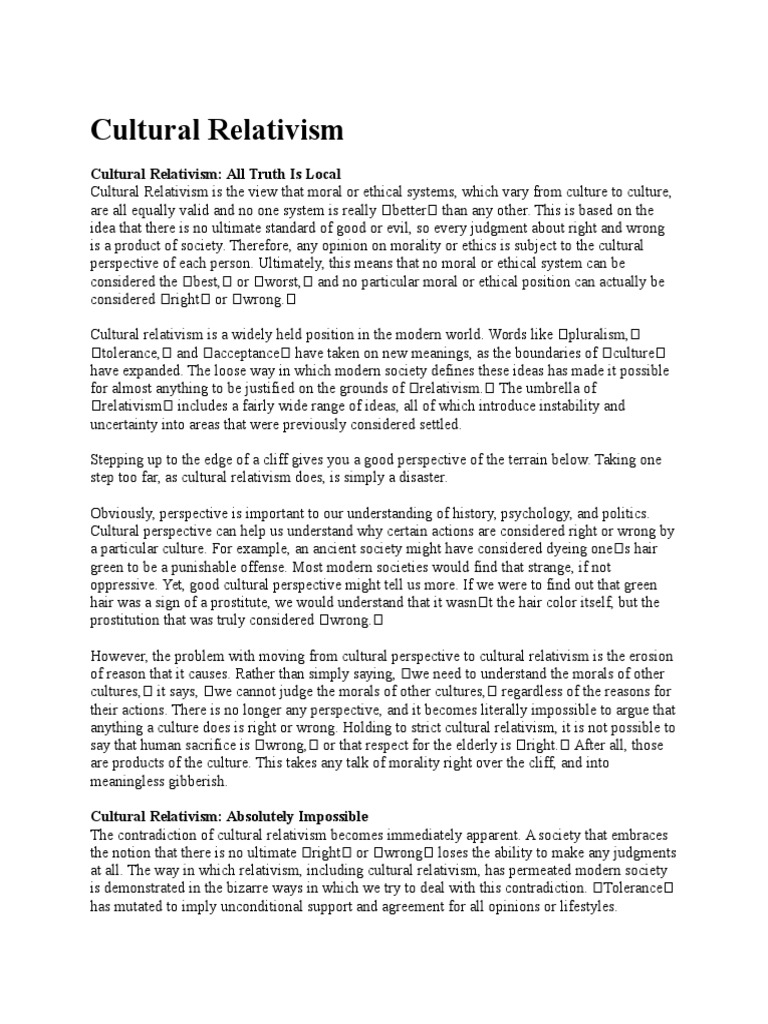Cultural relativism posits that moral codes and beliefs are shaped by cultural contexts and should be interpreted within those frameworks. While this perspective encourages understanding and tolerance of diverse cultures, it engenders a significant self-contradiction. This contradiction emerges when one surveys its foundational principle: if all cultural beliefs are valid and morality is entirely subjective, can one assert that cultural relativism itself is an absolute truth? This inquiry leads to the core of the issue, challenging the very essence of cultural relativism.
To dissect this conundrum, let us first consider what cultural relativism entails. It is the view that ethical and social standards are relative to the individual within a cultural context. For instance, a practice that is deemed morally acceptable in one culture might be judged as repugnant in another. Consequently, cultural relativists argue, no cultural practice can be universally condemned because all cultures are equal in moral authority. This stance ostensibly fosters a spirit of coexistence and cultural appreciation; however, it also leaves individuals vulnerable to endorsing practices that contradict universal human rights.
What happens when a culture endorses genocide as part of its tradition? Or when a society practices systemic discrimination based on ethnicity, gender, or sexual orientation? If one adopts a strictly relativistic viewpoint, such heinous actions cannot be universally condemned without violating the principle of cultural relativism itself. This contradiction manifests as a moral quandary: does one prioritize cultural integrity over human rights? If so, does that mean that actions violating fundamental human dignity could potentially be justified based on cultural context? This paradox compels one to question the logical integrity of cultural relativism.
Philosophically, cultural relativism champions that all perspectives are equally legitimate; yet, this inherently breeds an inconsistency. A cultural relativist may argue that their commitment to tolerance and understanding is a virtue, yet in practice, it can lead to the acceptance of egregiously immoral practices. Herein lies the playful question: can one uphold the belief in cultural relativism while simultaneously opposing practices that cause harm or injustice? This ideological riddle beckons critical analysis of both the theoretical framework and real-world applications of cultural relativism.
As we navigate these complexities, it is essential to delve into the implications of cultural relativism on moral discourse. For instance, if ethical principles are infinitely malleable, what mechanisms exist to engage in intercultural dialogue? By embracing cultural relativism, one may inadvertently eschew advocating for ethical progress in societies that engage in oppressive practices. It fosters an environment where exposures to diverse ethical viewpoints transform into an uncritical acceptance of all actions. The very act of critique becomes a moral hazard when one espouses a relativistic viewpoint.
Furthermore, cultural relativism often basks in the illusion of egalitarianism while suspending critical scrutiny. This stance fosters a dangerous complacency, allowing individuals to overlook signs of social injustice. How does one confront the plight of marginalized groups if cultural norms dictating their oppression are sanctified? The enduring struggle for equality and justice emboldens the argument for universal moral standards. A consideration of universal principles becomes not merely an ethical endeavor but a necessity for mitigating harm wrought by extreme cultural particularities.
Ultimately, the self-contradiction of cultural relativism lies in its inability to provide a definitive moral compass. It challenges us to reflect: if every culture establishes its own moral framework, is there even a basis for assessing the moral integrity of cultural relativism? The insistence that all beliefs are equally valid often negates the opportunity for critical evaluation of cultural practices, significantly when they violate fundamental ethical norms. Hence, a more nuanced approach is essential—one that advocates for cultural sensitivity while concurrently establishing a commitment to universal human rights.
In light of this discourse, it becomes evident that cultural relativism is fraught with ambiguities and contradictions that complicate moral reasoning. Advocates for cultural relativism embody a commendable intention to promote tolerance and understanding; yet, the practicality of this perspective warrants rigorous scrutiny. This ideological predicament envelops us in a web of moral dilemmas, prompting us to ask yet again: How do we reconcile the respect for diverse cultural practices while ensuring the freedom and dignity of all individuals?
The essence of this inquiry transcends philosophical debate; it echoes deeply in contemporary discussions surrounding globalization, human rights, and ethical governance. In a world rife with cultural diversity, the challenge lies in harmonizing the values of individual rights with the appreciation of cultural idiosyncrasies. A balanced approach requires fostering dialogue and understanding, espousing core human rights that strive for the flourishing of humanity amidst its richly varied tapestry.
In conclusion, while cultural relativism offers invaluable insights into human diversity, its inherent contradictions cannot be overlooked. The quest for morality must traverse beyond cultural confines, moving toward the establishment of moral principles that uphold human dignity universally. In our interconnected world, the dialogue must continue, one that respects both freedom of belief and the sanctity of human rights—an ambition we must ardently pursue.
